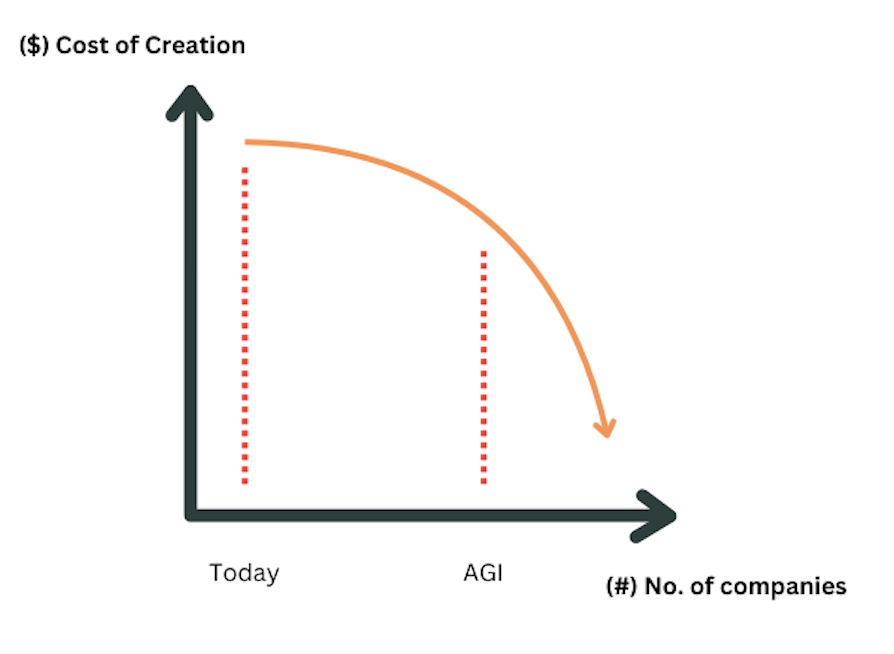Artificial Intelligence is just beginning its cambrian explosion; no one, not even employees at the top companies building AI could have predicted how fast AI tools would proliferate. The infrastructure powering this technology has scaled tremendously in the last decade. AGI is just around the corner. We built a technology that supersedes human intelligence in many ways… all for what?
Now that sci-fi level AGI is within reach, a fundamental question technologists and businessmen alike should ponder is "what can we do if intelligence is free". For general-purpose technological innovations like the transistor, the internet, and AGI, the future impact is non-obvious at the time of creation. It is the job of builders (and markets) to determine the applications and use-cases. These people bear the burden of turning magic into something people want.
If AGI is accomplished, and all users get is a better search engine, this experiment is a failure. Most AI applications today are still relatively elementary. Where are all the 100 billion dollar AI startups? Where is the future we were promised? How can we think about what it is that will exist?
Software continues to eat the world
The most obvious and clear applications in AI are extensions of software. As "software eats the world", AI plays an important role in enhancing existing software applications. It is unclear whether these efficiency gains accrue to incumbents or newcomers. The slow adoption of software in many areas of the economy suggests that many new companies will be born with "using AI tools" as their sole advantage, but many incumbents are already throwing money at large language models to protect their businesses. OpenAI's copilot, Devin, and Perplexity are already drastically disrupting existing workflows and impacting productivity very tangibly.
AI tools are also an extension to existing consumer applications, there are likely many successful companies hiding in AI + Social, CPG/Shopping + AI, and more generally, AI + {insert mobile app genre}.
Generative AI
Content generation is at the core of any media or social platform. Volume keeps users busy, and quality keeps them addicted. TikTok infamously has used complex reinforcement learning algorithms to greedily show you addicting content. Existing platforms create incentives for users to create content, or spend millions to generate content internally. Language models flip this model on its head; content can be created and refined for cents. Personalized content is just the beginning of what generative models can do for platforms.
Generative AI will be a tool for platforms, creators, and advertisers to produce more content, cheaper. Outside of value accrual to platforms, all content should simply get better. Better Youtube videos, better Instagram ads, better articles in the New York Times. Imagine Marley and Me but with the ending we all really wanted. Gen AI will crush existing monopolies on content creation, and winners will be chosen by the quality and distribution.
On the margins
The productivity improvements of AI have a third order effect of decreasing the cost to create. At any given time, there are a set of companies/ideas that cannot be pursued because the cost to create (in dollars or time) is too expensive. In the case of nuclear reactors, many governments can't afford to pursue this obvious high-impact project. General purpose productivity improvements decrease the cost of creating and operating businesses, which exponentially increases the number of "profitable" things to work on.

This relationship is obviously true for software companies, where AI tools already make developers more productive. As companies trust AI tools and agents to control admin overhead, sales processes, marketing and more, we move further right along the curve. In other fields, productivity improvements may come in the form of doing paperwork and applying for grants more efficiently: genetics, robotics, and large infrastructure projects.
Past technological revolutions tell us that building the infrastructure is only the first chapter; applications come later and are hard to predict. Energy companies were initially built to service private clients, transistors to replace vacuum tubes, fiber optic cables for telephone networks. Each of these building blocks grew to support something orders of magnitude more important. Jevon's paradox suggests that demand ensues technological efficiency, not the other way around. It is likely that the killer AI applications won't be clear to us for a while.
There's a ton of opportunity in AI, but it seems that we are overestimating the short run and underestimating the long run potential of the technology. Despite this, fortune favors the bold; those building companies now will be the face of the largest companies in 20 years.
What would you do if intelligence was free?